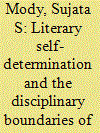| Srl | Item |
| 1 |
ID:
184797


|
|
|
|
|
| Summary/Abstract |
From 1948 to 1994, the newsreels and documentaries produced by the Films Division of India (FD) were a ubiquitous presence in Indian public life. Even as some audiences learnt to avoid sitting through yet another newsreel about the benefits of economic planning, the FD vision of harmonious, planned development continued to haunt the collective unconscious of post-colonial India well into the 1980s. Drawing on examples from documentary cinema, Indian New Wave films, and modern Hindi literature, this article explores three scenes of disillusionment with the FD’s version of the Nehruvian dream. I argue that the FD archive is a particularly productive site from which we can ask uncomfortable questions about the experience of Nehruvian socialism: the ‘illusions’ of the past continue to haunt FD films even in moments of disillusionment, prompting a form of self-reckoning whose full implications can only be grasped now, in retrospect.
|
|
|
|
|
|
|
|
|
|
|
|
|
|
|
|
| 2 |
ID:
182852


|
|
|
|
|
| Summary/Abstract |
This essay traces the literary afterlife of Hindi writer Gajanan Madhav Muktibodh (1917–64). Like many in his generation, Muktibodh’s life and world-view were transformed by his encounter with communism during the years of World War II. Though much of his poetry remained unpublished while he was alive, Muktibodh was posthumously recognised as one of the most significant writers of the Nehruvian period and has been a cult figure in the Hindi literary world since the 1970s. By tracking the influence of Muktibodh’s elliptical poetry and prose on modern Hindi literature and cinema, this essay reconstructs the rise and fall of the late colonial vision of a possible ‘Soviet India’.
|
|
|
|
|
|
|
|
|
|
|
|
|
|
|
|
| 3 |
ID:
177196


|
|
|
|
|
| Summary/Abstract |
In this paper, I explore the ways in which queer sex acts and orientations come to be coded through other modes of signifying excess in colonial and nationalist discourse. I explore the way in which food and sex are held on a continuum that ties gluttony to abstinence, creating the standards for respectable sexuality and a map for flouting them. Fundamentally, I look at how sex and food are conflated, especially when enjoyed or imagined in ways outside the norm of conventional morality. Moreover, I examine the terms through which this correlation is translated into a broader framework for thinking about the body in its private and shared forms.
|
|
|
|
|
|
|
|
|
|
|
|
|
|
|
|
| 4 |
ID:
117601


|
|
|
|
|
| Publication |
2012.
|
| Summary/Abstract |
This article examines Mahavir Prasad Dwivedi's project of literary self-determination, as articulated in two programmatic essays published in the Hindi journal Sarasvati under his editorship (1903-1920), scrutinising his construction of literature as a culturally embedded category of national consequence. His theorisation of Hindi literature as broadly inclusive in terms of its basic definition and function supported the growth of what he considered a national treasury of literature. His discussion of its historical and linguistic parameters and his emphasis on a prioritised plan of literary production, reified the notion of a modern discipline oriented towards a narrowly constructed national collective that sought to establish its sovereign identity via literature in Khari Boli Hindi. Though not explicit in its anti-colonial nationalism, this project nevertheless privileged Hindi as the projected lead language of a modern sovereign nation, with all the risks that delimitation entailed.
|
|
|
|
|
|
|
|
|
|
|
|
|
|
|
|